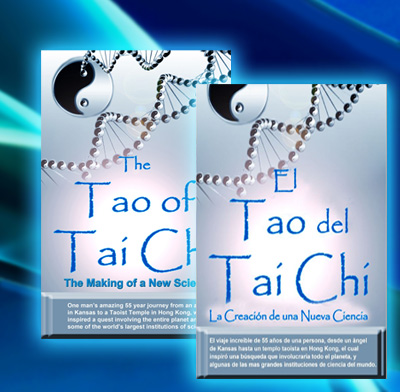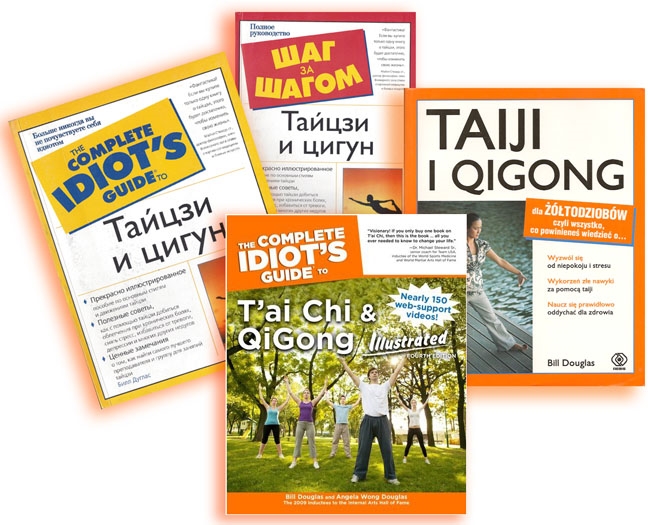cardio-respiratory benefits and Tai Chi & qigong
CARDIO-RESPIRATORY BENEFITS of Tai Chi & Qigong
CARDIO-RESPERITORY EFFECTS of TAI CHI:
Harvard Health Publications
Heart disease. A 53-person study at National Taiwan University
found that a year of tai chi significantly boosted
exercise capacity, lowered blood pressure, and improved levels
of cholesterol, triglycerides, insulin, and C-reactive protein
in people at high risk for heart disease. The study, which was
published in the September 2008 Journal of Alternative and
Complementary Medicine, found no improvement in a control
group that did not practice tai chi.
Heart failure. In a 30-person pilot
study at Harvard Medical School, 12 weeks of tai chi improved
participants' ability to walk and quality of life. It also
reduced blood levels of B-type natriuretic protein, an
indicator of heart failure. A 150-patient controlled trial is
under way.
Hypertension. In a review of 26 studies in English or Chinese
published in Preventive Cardiology (Spring 2008), Dr. Yeh
reported that in 85% of trials, tai chi lowered blood pressure
— with improvements ranging from 3 to 32 mm Hg in systolic
pressure and from 2 to 18 mm Hg in diastolic pressure.
Stroke. In 136 patients who'd had a
stroke at least six months earlier, 12 weeks of tai chi
improved standing balance more than a general exercise program
that entailed breathing, stretching, and mobilizing muscles
and joints involved in sitting and walking. Findings were
published in the January 2009 issue of Neurorehabilitation and
Neural Repair.
Pulmonary Medicine:
Breathing. Studies have shown better respiratory function in
Tai Chi practitioners compared to those who are sdentary.
What's more, Tai Chi appears to slow the loss of respiratory
function in older adults over time in studies up to five years
long. (Harvard Medical School Guide to Tai Chi. Page 172)
COPD (Projected to be the 3rd leading
cause of death in US by 2020). Conventional pulmonary rehab.
programs focus on aerobic exercise and strength training to
improve exercise capacity, quality of life, and symptoms in
patients with COPD. Tai Chi extends the breathing techniques
taught in pulmonary rehab. by integrating novel elements, such
as progressive relaxation, imagery/visualization, mindfulness
of breathing and overall body sensations, postural training,
and coordinated patterns of breathing and movement. These
additional therapeutic elements make Tai Chi an effective
adjunct to conventional rehabilitation.
Studies: A Harvard study
showed that after 12 weeks the Tai Chi group felt significant
improvement in chronic respiratory symptoms compared to the
usual COPD care group. The Tai Chi group also had slight
improvements in their six-minute walking distance, depression,
and shortness of breath. Harvard is following up with a larger
NIH funded study to compare a Tai Chi group to other
meditative techniques, as well as to a non-exercise education
program.
A
larger Hong Kong study found a Tai Chi Qigong group improved
key measures of respiratory function and participated in
higher levels of activity when compared to a walking plus
breathing exercise or usual care group. The Tai Chi group also
reported greater improvements in respiratory health-related
quality of life.
Conclusion: The data
substatiate that practicing T'ai Chi regularly may delay the
decline of cardioresperatory function in older individuals. In
addition, TC may be prescribed as a suitable aerobics exercise
for older adults. Journal of American Geriatric
Society, Nov. 1995, 43 (11) p 1222-1227 ISSN
0002-8614 Journal Code: H6V
Research shows that Tai Chi-like
exercises, including Qigong, may help sustain the gains COPD
patients make after completing pulmonary rehabilitation, which
often is lost after about six months. (Harvard Medical School
Guide to Tai Chi, pages 176 to 178.)
Read more at Harvard Health Publications ...
Tai Chi Benefits Your Heart
Several types of gentle Chinese exercise have been found to
lower blood pressure and bad cholesterol levels
-- ConsumerReports.org
FIND MUCH MORE RESEARCH AT THE "QIGONG INSTITUTE DATABASE"
Since 1984, collecting breaking medical/science research on
Qigong, Tai Chi, Yoga, and Mind-Body Education
Click here
for Qigong Institute Database...
* NOTE: World Tai Chi & Qigong Day advises
consulting your physician before beginning any new exercise,
herbal, diet, or health program. The research listed here is
meant to stimulate a discussion between you and your
physician, health insurance carrier, etc., not as medical
advise. Research and comments provided here are hoped to
stimulate a more robust discussion of powerful natural
mind/body health tools. Popular media, health media, and
government must increase attention to stunning emerging
research, including the UCLA study indicating Tai Chi
participants enjoyed a 50% increase in immune system
resistance to viral infection.
- To learn more about tai chi & qigong medical research,
see the below book,
"the complete idiot's guide to tai chi & qigong,", and also
"Harvard Medical School Guide to Tai Chi," and
"The way of qigong: the art and science of chinese energy healing."
Click to purchase this acclaimed best-selling Tai Chi book, with nearly 150 web-video support videos for the detailed text/illustration instruction as a "gift of health" for loved ones.
A new paradigm in multi-media educational books.
"Visionary! If you only buy one book on T'ai Chi, then this
is the book. This book is all you ever needed to know to
change your life. I have taught T'ai Chi for several decades
myself, yet I have now read Bill's book from cover to cover
seven times, and still get something new from it each time."
– Dr. Michael Steward Sr., D.MA, Ph.D., MA, Senior
Coach for Team USA, Inductee of the World Sports Medicine and
World Martial Arts Hall of Fame
"Sometimes Chinese
culture can be difficult to explain. Sifu Bill Douglas
successfully uses American culture to explain the art of T'ai
Chi Chuan. He simplifies difficult concepts, making them
easier to understand. This book takes the best parts of T'ai
Chi and makes them understandable [to Westerners] without
requiring a grounding in Chinese culture and history."
– Sifu Yijiao Hong, USA All-Tai Chi Grand Champion and USA
Team member; Certified International Coach and Judge,
International Wushu Federation
"Douglas has
achieved for QiGong what Apple did for the computer. He's
brought it to the people … great place to start for beginners.
… Teachers may also find this an excellent manual 'on how to
explain these concepts to the general public…'"
– R.
Poccia,
"The Tao of Tai Chi: The Making of a New Science" (now available in both English and Spanish))

Harvard's Dr. Peter Wayne discusses Tai Chi, Qigong and Bio-Energy with Neuro-biologist, Dr. Richard Hammerschlag,
with WORLD TAI CHI & QIGONG DAY ONLINE SUMMIT HOSTS
World Tai Chi & Qigong Day's series of Official ONLINE
SUMMITS, have brought some of the top minds in Tai Chi, Qigong,
and cutting edge scientists researching Mind-Body practices.
World Tai Chi & Qigong Day's global health education work was
recognized on page 25 of "The Harvard Medical School Guide to
Tai Chi" ...
A reflection of how successful the invasion
has been is World Tai Chi Day, organized by Bill Douglas. One of
the purposes of this day is ‘to bring together people across
racial, economic, religious, and geo-political boundaries, to
join together for the purpose of health and healing, providing
an example to the world.' Millions of people around the world –
65 nations participated in 2011 – gather one day each year to
celebrate the health and healing benefits of Tai Chi and Qigong.
— The Harvard Medical School Guide to Tai Chi (page 25)
Harvard Medical School Researchers Launch 'Tai Chi as Therapy' Lecture to Commemorate World Tai Chi Day
The new Harvard Medical School Guide to Tai Chi is a powerful
reference book for all tai chi and qigong advocates, teachers,
etc. The Harvard Guide cites WorldTaiChiDay.org's work in
expanding global awareness of tai chi and qigong!
Our
efforts have exposed over ONE BILLION potential viewers/readers
of mass media to Tai Chi and Qigong and its myriad health
benefits, via our annual WTCQD worldwide events.
